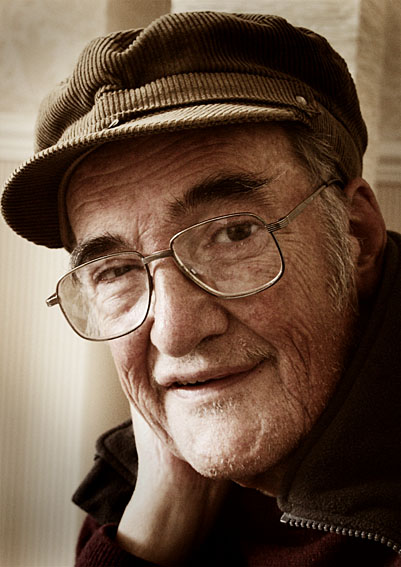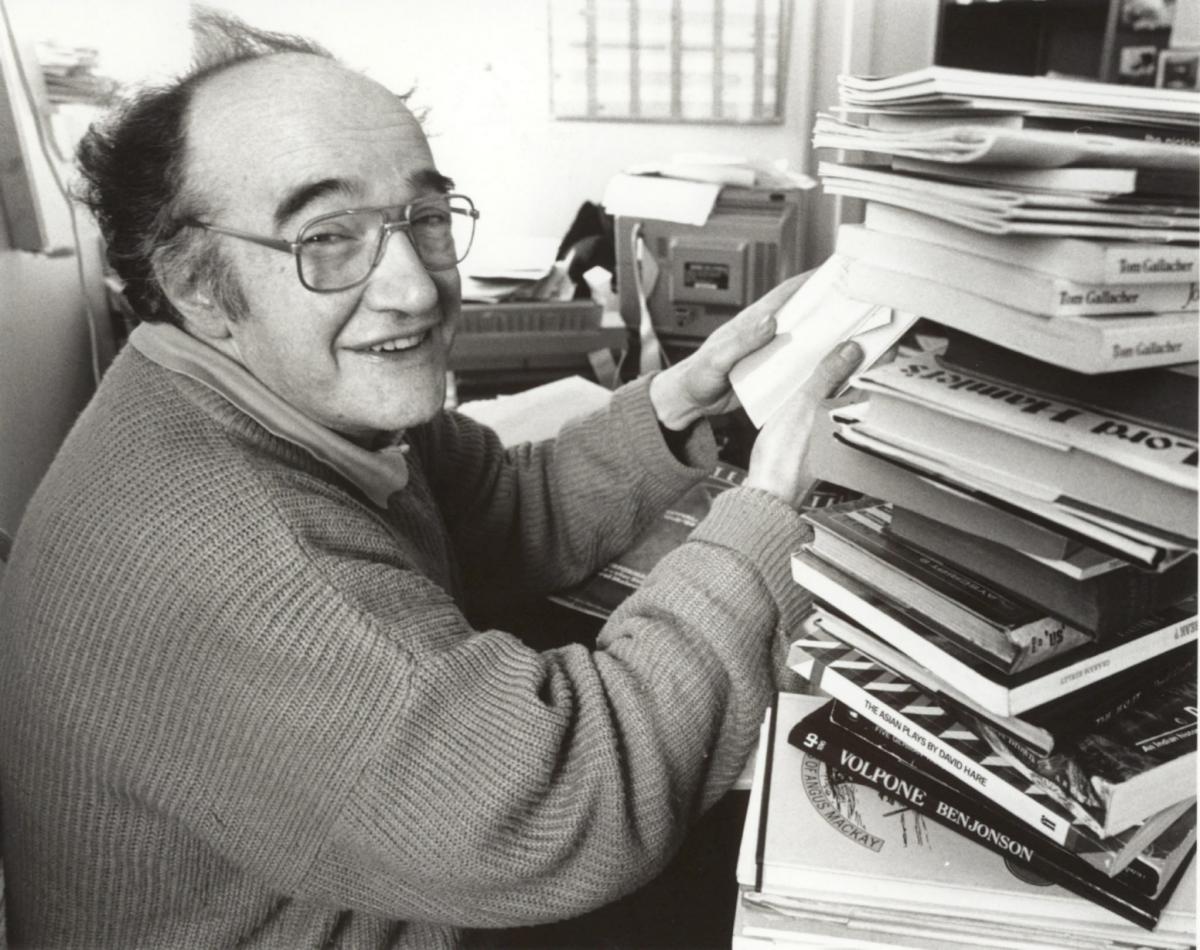Born in Rutherglen, near Glasgow, on October 3rd 1940, Tom McGrath had notions of artistic exploration from a very early age. Captivated by the likes of Charles Olsen, Gertrude Stein, Jack Kerouac and Charlie “Bird” Parker, the young McGrath shunned the oppressive Presbyterian atmosphere that surrounded him in Scotland, choosing instead to focus on the faraway wonders of American beat-culture. However, after reading Young Adam by notorious Glaswegian writer Alexander Trocchi, he realised that perhaps the artistic stimulation he sought could be found a little closer to home.
“Trocchi was dangerous, exciting, switched-on, international.”
- Tom McGrath on Alexander Trocchi

McGrath’s early fascination with counterculture brought him into contact with its Scottish advocates such as Trocchi and R. D. Laing, with whom, inspired by Timothy Leary, he would become involved in Project Sigma, a blueprint for cultural revolution. This activity would lead to him being invited to read at the International Poetry Incarnation in the Albert Hall, a beat-poetry summit featuring a line-up including Trocchi and Allan Ginsberg, (this event is captured in Peter Whitehead’s Wholly Communion, screening as part of this strand). Becoming features editor of Peace News in 1965, and then co-founding and editing radical counterculture magazine The International Times in 1966/67, McGrath eventually returned to Scotland in 1968 and enrolled at Glasgow University to study English and Drama. In 1969 his work was featured in Michael Horovitz’s significant anthology Children of Albion: Poetry of the Underground in Britain and in 1971, McGrath’s own The Buddah Poems was published.
sitting
with some dignity
across from
myself
- Tom McGrath, 9. from The Buddah Poems
McGrath first became involved with the Traverse Theatre in 1972, providing music for Tom Buchan’s Tell Charlie Thanks for the Truss. This connection would develop in 1973 with McGrath being brought in as Musical Director on Buchan’s The Great Northern Welly Boot Show starring Billy Connolly, Bill Paterson and Alex Norton, and featuring the designs of artist John Byrne, (including Connolly’s iconic banana boots). It was also during this era that McGrath brought several legendary jazz musicians across the Atlantic to play in Scotland, his astonishing guests including Miles Davis, (who informed McGrath that his suit was a nice one “for a white man”), Duke Ellington and The Mahavishnu Orchestra. In 1974, McGrath made the first of many absolutely crucial contributions to the Scottish arts when he founded, and became first Artistic Director of, the Third Eye Centre in Glasgow, which would latterly become the Centre for Contemporary Arts.
“I’d been playing piano in The Great Northern Welly Boot Show and I’d watch how the actors would build their comic business. I’d talk a lot to Kenny [Ireland] about the relationship between comic business and jazz. Being on stage with Billy Connolly, you couldn’t help but notice they were so much into rhythms. I could tell from the way the actors were hitting the rhythms of the speech whether they were going to get a laugh or not - or how big the laugh was going to be."
- Tom McGrath
1976 saw McGrath write the first of his many plays, the classic Laurel and Hardy for The Traverse. The show, starring John Sheddon and Kenny Ireland, was a huge hit, transferring to the Mayfair Theatre in London, and it signalled the dawn of a golden era for McGrath as a playwright. Delivering an unbroken run of groundbreaking work that spanned the 1970s, his scripts from this era include The Hard Man in 1977 and The Android Circuit in 1978 for The Traverse (both being staged as part of this strand); Sisters in 1978 for the Theatre Royal, Stratford East; semi-autobiographical The Innocent in 1979 for the Royal Shakespeare Company; and Animal for the Traverse in 1979, (a mute play featuring fourteen apes and two men). McGrath then travelled to America to teach playwriting at the University of Iowa and upon his return to Scotland in 1980 he was appointed the Scottish Arts Council’s Writer in Residence at The Traverse.
“I think the theatre should reflect society, and if it does reflect a society, members of that society will come and see it.”
- Tom McGrath

McGrath wrote 1-2-3 (Who Are You Anyway; Very Important Person; Moondog) for the Traverse in 1981. The show transferred to the ICA in London and Very Important Person and Moondog were broadcast on BBC Radio 3. The same year he would also play an important role in the foundation of the Tron Theatre Club, precursor to the Tron Theatre. In 1982, he contributed to the BBC’s Play for Tomorrow series with The Nuclear Family, (screening as part of this strand); adapted Neil Gunn’s novel The Silver Darlings for BBC Radio 4; and co-wrote soap-opera Kilbreck for BBC Radio Scotland. Working with Borderline Theatre he provided music for their version of Aladdin, and in 1983 wrote The Phone Box for their touring company. Around this time, McGrath was interviewed in great depth for The Riverside Interviews 6. This book is still undoubtedly the primary source of information on his life and work, (and proved absolutely invaluable in the curation of this strand). Throughout the rest of the decade, McGrath would continue to produce challenging and entertaining work such as Kora for the Traverse in 1986; Trivial Pursuits for The Royal Lyceum in 1988; and CITY for Tramway in 1989. A collection of his poetry, Sardines, was also published in the late eighties, (and republished in 2014), and McGrath was appointed as the Scottish Arts Council's Associate Literary Director, based at the Royal Lyceum Theatre, Edinburgh.
What’s that?
It’s a fish.
A fish?
Aye, yae know thae things that poison yae.
- Tom McGrath, Fish from Sardines
In 1990, after writing The Flitting for Cumbernauld Theatre, McGrath staged The Deviant Tradition at the Royal Lyceum. A series of readings featuring the work of German writers Heiner Muller and Tankred Dorst interspersed with material by Alexander Trocchi, this highly successful experiment would lead to an acclaimed two-part production of Dorst’s Merlin being staged, adapted by McGrath for the Royal Lyceum Theatre Company from a translation by Ella Wildridge.
“It’s set in a sliding time-zone, and it does really extraordinary things to your mind. You get the feeling that it’s not really about Arthurian legend at all but about something inside you.”
- Tom McGrath on Tankred Dorst’s Merlin

As the nineties unfolded, the steady stream of memorable McGrath scripts continued, including Buchanan for the Traverse in 1993; a version of Robert Louis Stevenson’s Kidnapped for the Royal Lyceum in 1994; and a translation of Daniel Danis' Stones and Ashes for the Traverse in 1995. Before the decade was over, he would also revise Mary Shelley’s Frankenstein for children’s theatre company Catherine Wheels; release poetry collection Birdcalls; write the Johann Sebastian Bach inspired The Dream Train for Magnetic North; script the short film Aboot the Hoose for the 1987 Housing Conditions Campaign; and oversee David Miller’s A Meeting with the Monster: The Life and Times of Alexander Trocchi for Merlin. Having adapted Electra for Theatre Babel in 2000 as part of their trilogy The Greeks, (also including Liz Lochead’s Medea and David Greig’s Oedipus), McGrath would return to the public eye one last time in 2005 with his final script, the poignant My Old Man for Magnetic North.
"This latest play is about old age. It came from a notion I had about how old people were depicted on stage: they always seem to be the same thing and that annoyed me. But as I was writing it, it became something personal because I became a grandfather."
- Tom McGrath on My Old Man

